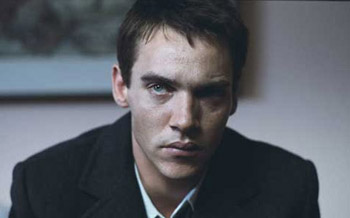
Glad to see Sandra Bernhard's got a new show,
"Everything Bad and Beautiful", at the Daryl Roth Theatre in Manhattan. Burning sass in a savage time. Nothing like it, or like Bernhard, for whom I completely fell when I first saw her in "The King Of Comedy" making a bound and gagged Jerry Lewis squirm with her ballistic night club act. My devotion was then forever won with "Without You I'm Nothing," the 1990 film which remains a personal fave. What I love about Bernhard is her utter and complete confidence, especially when she sings -- yet hints of insecurity emerge, as though she knows there are more glamorous performers with smoother voices and killer looks, but this accelerates her intensity, forcing you to immediately choose whether or not you can handle the full ride. A lot of people can't, and openly find Bernhard to be too abrasive, off-putting or disorienting. To me it's music falling from the cool night sky.
I also love how Bernhard weaves autobiographical material through a mad variety of pop culture & political references. Nothing is too cheesy or overtly obvious to use, and it shows how much the larger culture informs if not shapes our consciousness as we grow, later becoming the soundtrack to our memories. I happen to be in this very place at the moment, mostly for authorial reasons, but also to bridge the chaotic scenes from my past, put them in rough context, soothe some of the jangled nerves that have long tormented me. So news of Bernhard's newest stage offering, in which, apparently, she sings, rants and coos about her life up to now, is perfectly timed for what I'm composing. If I didn't look so frumpish in a sequined gown and beehive wig, the final effect would be even more dazzling.
Last weekend, I visited places that I hadn't seen in ages. It's interesting how direct physical exposure to a house, neighborhood or school not only clarifies memories that have started to fade or otherwise shift, it gives you an immediate, if fleeting, sensory reminder of how you felt at a specific moment in time. Standing in front of Francis Bellamy 102, the elementary school I attended (which is a block from the cul de sac I flew around as a kid), I reconnected with the confusion and dread I often experienced back then, when I would act up in class, stand on top of my desk and sing, draw giant fish on the chalkboard once the teacher left the room, then either get paddled by the school's principal, or punished later at home by my Dad, who was often called in to deal with his rebellious son. (Dad hated spanking me, and only did it a few times, but it never affected his appetite, whacking my bare ass with one hand while eating a bologna sandwich with the other.) This reconnection lasted maybe thirty seconds, yet I was completely transported, the six/seven-year-old boy trembling with anxiety once again.
Similar direct emotional sensations were felt throughout the weekend, some happier than others, but all of it under a wistful cloud. Driving down the long rural road that leads to the house where I lived with my Dad and Stepmother from 12 to 16 was especially overwhelming, as I still dream about that two-lane blacktop lined with acres of wood, abandoned corn fields and a few farm houses. The north side of the road remains as it was 30 years ago, almost eerily unchanged. The south side, sadly, is choked with prefab houses, the farm homes long ago torn down. Our old house is still there, sitting on 2 acres of yard, the swimming pool my Dad had built now corralled by a wooden fence. But where there was once fields as far as you could see (part of which I accidentally burned down when I was 12 -- two fire trucks needed to extinguish the flames filmed by local TV news, my broadcast debut, as it were) is completely covered with more prefab housing, many of the yards littered with garbage, rusting swingsets, abandoned refrigerators. The man who lives there makes his living repairing small engines in the garage I spent hours in, messing around with old tools, working on my cross-over dribble with an ABA basketball, playing with Rock 'Em Sock 'Em Robots. He was extremely gracious as I told him about my time there; and while I dropped plenty of clear hints that I would love to see the inside of the house, primarily the cold basement where my bedroom was located (another regular dreamscape), the guy had no intention of letting me take a nostalgic tour. Still, I hadn't set foot in that garage since 1976; and that alone flooded my senses so thoroughly that it was an hour before my head returned to the present. I can't imagine how I would've handled the basement, the scene of so much activity, happiness and anger.
I was helped along my retro-journey by the numerous CD compilations burned by my friend Luke. Most songs on the discs have specific meanings set in specific times, while others establish general moods that capture certain periods. In this I share Sandra Bernhard's love of and intense connection to the music of one's past. In a way it's limiting to have old pop/soul/punk singles serve as guideposts when touring old haunts, using a stranger's musical expression to lend meaning to one's earlier life. But it can't be avoided, and would be ridiculous to ignore. One of the steady constants of our commercialized existence, alas. Nostalgia may be a prison, but memory can never be caged.





